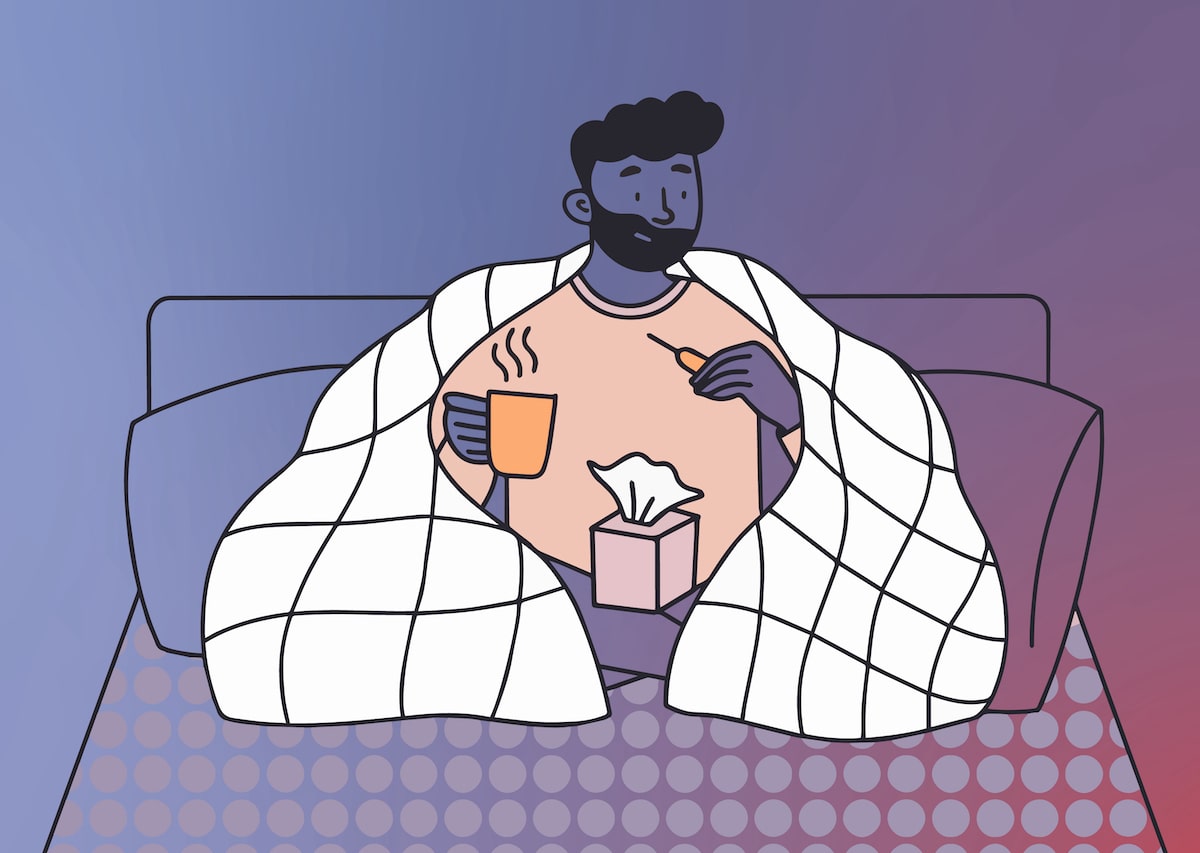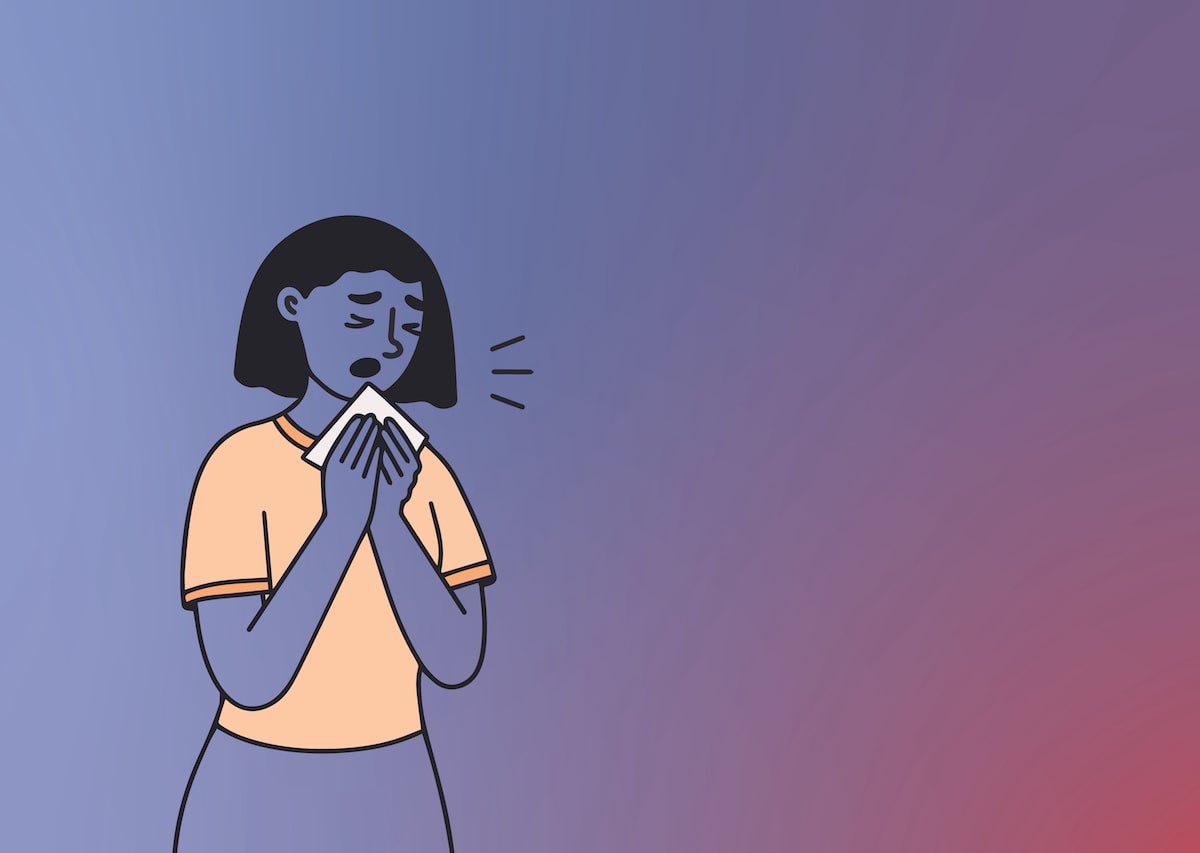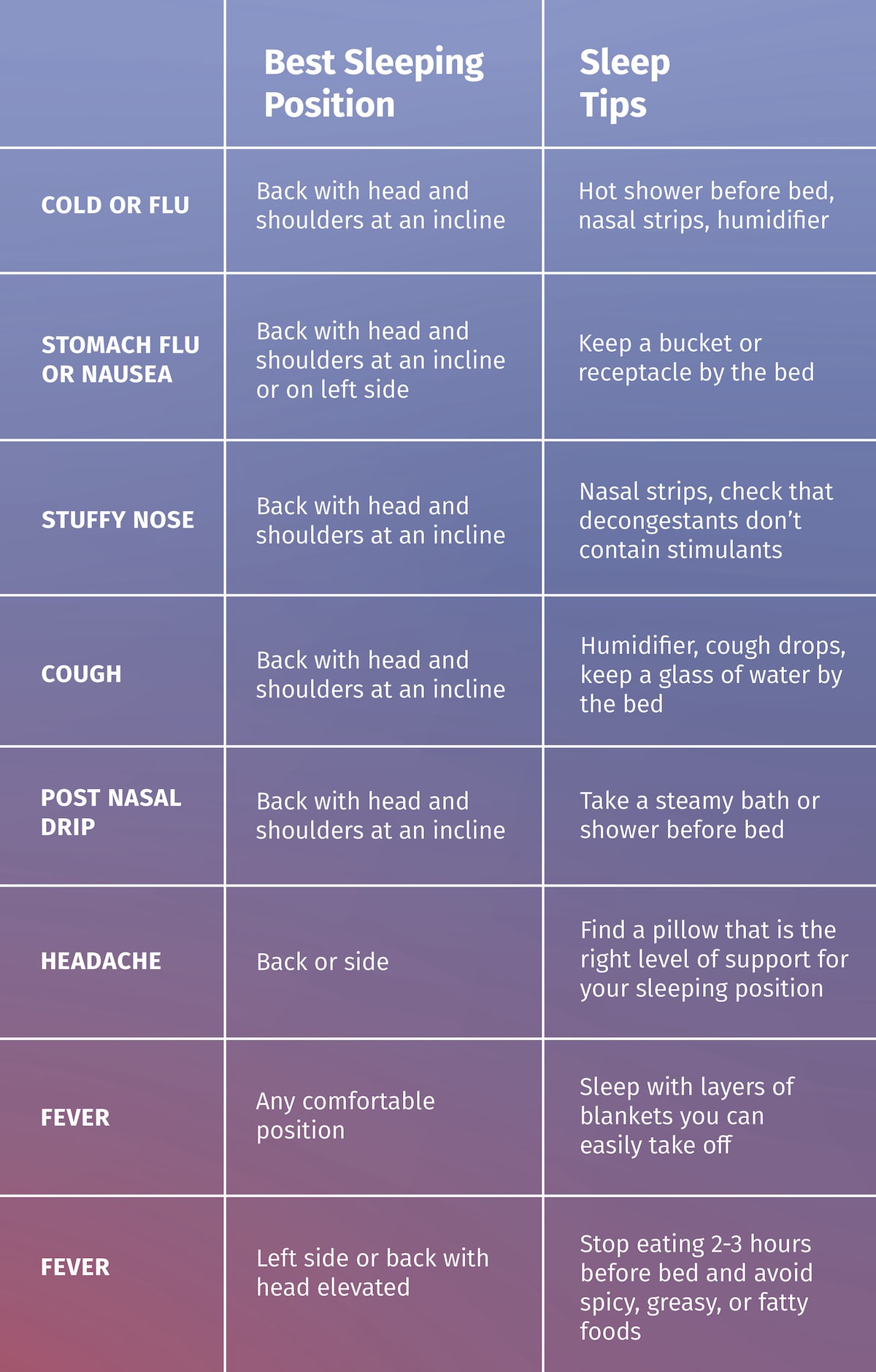Getting quality sleep can be difficult when you’re feeling under the weather. This article discusses ways to get your best night’s rest when sick.
It is no easy task to sleep when you’re sick. Whether you’re dealing with a cold, flu, or stomach problems, it can be so hard to close your eyes and drift off to dreamland. And once you do fall asleep, it can be difficult to stay asleep throughout the night.
While proper sleep is always important, it is imperative when we are sick. Sleep boosts our immune system and allows us to heal quicker. Studies show sleep can even stave off future infections and illnesses.
So, how can you get optimal sleep when you’re sick? Keep reading as we discuss expert tips on how to get the best sleep when sick.

Why Can’t I Sleep When I’m Sick?
It makes sense that when you’re sick you’d want to “sleep it off.” Unfortunately, pesky symptoms that accompany bugs can make falling asleep difficult. And once you do drift off, body aches, a runny or stuffy nose and headaches can interfere with good rest.
Have you ever noticed that, when you’re under the weather, as dusk begins to gather outside, your symptoms worsen? It’s not all in your head. Research shows that when the sun goes down, the body’s functions wind down as well, making you feel worse.
That has a lot to do with the circadian rhythm, the body’s personal 24-hour clock. It’s responsible for regulating the release of various hormones that make us sleepy or keep us awake. One hormone, called cortisol, helps regulate blood sugar levels, metabolism and blood pressure.
Cortisol also plays an important part in immune system function by reducing inflammation and helping you fight infections and illnesses. During the day, more cortisol courses through the body, suppressing the immune system. And that means fewer infection-fighting white blood cells are circulating as well.
At night, the body begins its repair work. Less cortisol is released into our systems and white blood cells become more active, detecting and fighting infections. This can trigger symptoms of the infection, such as fever, chills, sweats, head and body aches and nasal congestion.
Despite the added symptom of fatigue that often accompanies colds, viruses and other maladies, it’s difficult to get comfortable enough to fall asleep or stay asleep throughout the night.
How Much Should I Sleep When I’m Sick?
Healthy adults should get 7 to 9 hours of sleep each night in order to function best during the day, according to the Centers for Disease Control and Prevention (CDC). Good sleep helps ensure we wake feeling refreshed and that we don’t become sleepy during the day.
When you’re sick, it’s best to get at least one extra hour of sleep whether you go to bed an hour earlier at night, sleep in a little longer in the morning, or take a nap during the day. This gives your body much-needed time to fight infection so you can recover faster.
Some viruses like the flu or COVID can leave you extremely fatigued. If you feel you need more sleep, take it. The important thing is to listen to your body.
But be sure to drink plenty of fluids so you stay hydrated and eat what you can, as not eating when you’re sick can inhibit the body’s ability to heal itself.

How to Sleep When You’re Sick
There’s no doubt that when you’re sick getting a good night’s sleep — and even a good afternoon nap — can help your body fight infection and get you faster on the road to recovery. Different ailments come with different symptoms, and how you sleep can either help or worsen those symptoms. Let’s take a closer look at common illnesses and tips on how to get better sleep when you’re sick:
Sleeping with a Cold or the Flu
Colds are associated with a number of symptoms that include, but aren’t limited to, a runny nose, congestion, sneezing and coughing. It is not always easy to differentiate between the cold and the flu, but the latter is usually more extreme and can have other symptoms such as fever and body aches.
All of these symptoms can make sleeping a real chore. Your doctor might prescribe medication to ease symptoms, which can help you sleep. They may even provide you with medicine that makes you sleepy. But there are steps you can take beyond medication to make it easier for you to sleep.
First, if you are suffering from a cold or flu try to clear your airways as best as possible before you go to bed. Try using nasal strips or spray or even taking a hot shower right before bed. A humidifier can also go a long way in keeping those airways moisturized and open during the night.
In addition, if you have cold or flu symptoms, you can add an extra pillow under your head and shoulders so you sleep with your head at an incline of a few inches. This allows the congestion to drain out of your nose, reducing sinus pressure and making it easier to breathe.
When dealing with a cold or flu, you really want to make the bedroom as comfortable and conducive to sleep as possible. Try using an eye mask, blackout curtains, or a white noise machine. Also, don’t forget to practice good sleep hygiene by keeping the bedroom cool, quiet and dark.
Sleeping with the Stomach Flu or Nausea
If you are struggling with stomach flu, you may experience nausea and vomiting, and possibly stomach cramps and/or diarrhea. If you do begin to drift off to sleep, these miserable symptoms can often force you awake to bolt to the bathroom at a moment’s notice.
To help ease an upset stomach, sip on ginger or peppermint tea before bedtime to help settle your tummy. Try distracting yourself with a podcast or streaming show. And get as comfortable as possible. This may mean sleeping at an incline or on your side, especially the left side because it keeps the stomach acid lower in the esophagus. Sleeping on your side also reduces the chances of choking.
Be sure to keep a bucket or some sort of receptacle within arm’s reach in case you can’t make it to the bathroom in time. And drink plenty of fluids with electrolytes, even if you can only take a few small sips at a time. Vomiting and diarrhea can dehydrate you pretty quickly. You don’t want the added misery of dehydration symptoms when you’re battling the stomach flu.
Sleeping with a Stuffy Nose
Nasal congestion, or a “stuffy nose,” happens when the nasal tissues and blood vessels in the nose become swollen with extra fluid. This can make your nose feel clogged and make breathing through your nose difficult. A stuffy nose may or may not be accompanied by nasal discharge, giving you the feeling of a “runny nose.” Sometimes only one side of the nose gets congested, which can be especially frustrating.
Anything that inflames or irritates the nasal tissues can cause congestion. But the most common culprits are colds, flu, sinusitis and allergies, as well as tobacco smoke, smoke from a fireplace or fire pit, or even smog.
Decongestant sprays, pills, or liquids can help relieve congestion by reducing swelling in the tissues of the nose. Be sure to check the packaging; some decongestants contain stimulants that can keep you awake while others may have ingredients that make you sleepy.
You can also try nasal strips to open the airways, or use nasal sprays or a humidifier to help keep the nasal passages moist and prevent them from drying out.
When you are ready to go to bed, try sleeping on your back with your head and shoulders propped up on an extra pillow or two. This will allow any nasal congestion to drain and relieve sinus pressure.

Sleeping with a Cough
Coughs are reflexive actions that are intended to clear the airway of irritants. But they often accompany asthma, colds, or respiratory infections. There are different types of coughs — productive, or “wet” coughs that bring up a lot of phlegm, and non-productive, or “dry” coughs, that don’t.
When coughing worsens at night it’s usually due to post-nasal drip or acid reflux. When you lie down to sleep at night, you no longer have the benefit of gravity that you had during the day. That means rather than rolling down the back of your throat, mucus drains into your upper airway, activating the coughing reflex. For acid reflux sufferers, lying down can cause stomach acid to come back up the esophagus, burning and irritating the throat and causing you to cough.
Most over-the-counter and prescription cough medicines numb the cough reflex, but they don’t work for everyone. Heartburn medications can help reduce acid and ease acid reflux symptoms.
Cough drops or using a humidifier can help keep your throat moistened and prevent dry coughs. It may also help to keep a glass of water by your bed. If you’re prone to allergies, clean your sheets in scent-free detergent and remove any allergens — including pets.
For best results, sleep with your head elevated to allow gravity to do most of the work. Sleeping on your left side can also help reduce reflux as the angle it creates makes it harder for stomach acid to travel up the esophagus.
Sleeping with Post Nasal Drip
Our respiratory system pumps out more than a liter of mucus each day. Most of it slides down the back of our throats to our stomachs, eventually making its way out of the body. We usually don’t even notice it. But when we’re sick, the amount of mucus is amped up to help fight infection. That means our noses run and we become acutely aware of our post-nasal dripping. Post-nasal drip can cause itchy or sore throats. It can become a real drag when you’re trying to sleep.
Antihistamines and decongestants can help reduce post-nasal drip due to sinusitis, viruses, or allergies. Guaifenesin (brand name Mucinex) and staying well hydrated can also help thin the mucus.
Other tricks to try before bedtime to help ensure better sleep include using a humidifier or taking a steamy bath and elevating the head to prevent the mucus from dripping down into your airway.
Sleeping with a Headache
Headaches are common with or without illness. There are dozens of different types of headaches, the severity of which can vary from very mild to severe and debilitating. It’s probably no surprise to hear that headache sufferers are 2 to 8 times more likely to experience sleep problems compared to those who do not have them.
Prescription and over-the-counter painkillers can help, as can some lifestyle changes such as cutting out alcohol, staying well hydrated, having good posture and eating regular meals.
Major culprits of nighttime headaches include sleep position and the wrong type of pillow. It’s best to sleep on your side or back rather than on your stomach. Stomach sleeping causes you to turn your head in an awkward position, which creates neck strain and can trigger or worsen headaches.
Your sleep position should also dictate the type of pillow you use. Back sleepers need a cushioning pillow with a medium loft that keeps the natural curvature of the spine at the neck. Side sleepers should have a pillow with a higher loft that keeps the head raised so that the neck stays in alignment with the rest of the spine. If you must sleep on your stomach, use a thin pillow with minimal loft to help reduce neck strain.
Sleeping With a Fever
Fevers are usually a sign that our bodies are trying to kill an infection-causing virus or bacteria. These bugs don’t survive well in hotter temperatures. Fevers also trigger the body’s immune system. A normal temperature is considered 98.6 F. Temperatures 100 F or higher are considered fevers.
Fevers are helpful in fighting infection, but they can also be uncomfortable, causing sweats, chills and shivering, headaches, muscle aches, loss of appetite and fatigue.
If needed, medicines like acetaminophen, ibuprofen, or aspirin can reduce fevers and help alleviate symptoms to help you sleep better. It’s also important to drink plenty of fluids during the day so you remain hydrated.
When going to bed, it’s important to be as comfortable as possible. You may start sweating followed by a bout of chills, so be sure to have layers of blankets you can kick off as needed, as well as sheets and bedding made with moisture-wicking materials such as cotton, bamboo, or linen.
Sleeping with Heartburn
Most of us have experienced heartburn at some point in our lives. Simply put, heartburn feels like an uncomfortable burning sensation in the chest or throat. Heartburn is another term for gastroesophageal reflux (GERD) and occurs when stomach acid or bile rises up from the stomach and enters the esophagus. If it occurs more than twice a week, it may also be a symptom of gastroesophageal reflux disease (GERD), a much more serious condition.
According to the National Institute of Diabetes and Digestive and Kidney Diseases, GERD affects 20% of Americans every month. And, when all these people struggle with heartburn, it makes it much more difficult to fall asleep and stay asleep.
First off, if heartburn is an issue, medical experts recommend staying away from fatty, spicy and greasy foods. Also, acid and/or fatty foods like coffee, chocolate, beer and pizza can cause or exacerbate heartburn symptoms. It is also a good idea to stop eating two to three hours before bed. There are, of course, heartburn medications such as Prilosec, Zantac and other quick temporary treatments such as Tums.
New medication should always be discussed with your provider. “If someone is considering medication, they should always check with their provider. Many people take other drugs that may be contraindicated. It is best to confirm the provider before taking any,” says Lola Ravid, BSN, R.N., a registered nurse with a public health certification.
If you’re trying to fall asleep and struggle with heartburn, try sleeping with your head elevated six or eight inches. Gravity could help keep stomach acid and bile from coming up from the stomach.
In addition, try sleeping on your left side. According to a study, when people sleep on their right side, they are more likely to deal with heartburn. Lying in this position could relax the lower esophageal sphincter and make it easier for stomach acid to escape the stomach and move into the esophagus.
RELATED: The Best Sleeping Positions for Different Sleep Problems

Final Thoughts
It is important to get proper sleep when we are sick because we need to give our bodies time to heal. The ironic thing is, the sicker we are, the more difficult it is to fall and stay asleep. Still, taking these steps above, like creating a comfortable sleep environment and sleeping on the left side or propped up, can make it possible to get that much-needed sleep and wake up healed and refreshed.
FAQs
Does sleep help the stomach flu?
Yes, sleep can indeed help with the stomach flu. When we are sick with illnesses like stomach flu, sleep can boost our immune system, allowing us to recover more quickly.
How do you fall asleep when you are sick?
Those who are sick with a cold, flu, or heartburn could benefit from sleeping at an incline. Also, depending on what symptoms someone has, a humidifier can help open nasal passages and keep the throat from drying out. Lastly, keeping the bedroom dark, cool and quiet can prime the body for sleep.
Is it okay to sleep all day when sick?
While it is not uncommon for people to sleep for a long time when they are sick, it is always good to check in with a doctor if they are experiencing extreme fatigue. People should just keep an eye on their symptoms and talk to a doctor if they have concerns.
Is it better to rest or be active when sick?
This is going to depend on what type of sickness someone has and their own personal health record. For many, rest is more important than being active because it boosts the immune system and encourages healing. However, people can speak with their doctor if they’re interested in being active while sick.
Is it bad to sleep with the fan on while sick?
Sleeping with a fan on won’t make you sick, but it could exacerbate your symptoms. The moving air may dry out your mouth, nose and throat. This could cause your body to produce more mucus, which could lead to headaches, a stuffy nose and a sore throat.
How should you sleep if you feel nauseous?
You should sleep elevated and on your side when feeling nauseous. While it does not matter which side you lay on, sleeping on your side can reduce your chances of choking if you were to vomit in your sleep.

